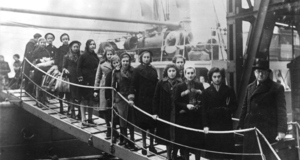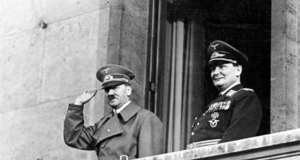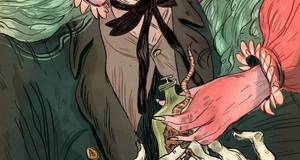Featured Article:The White Rose Movement: Conscience in Silent Nazi Germany
By
2010, Vol. 2 No. 09 | pg. 2/2 | « Within these words Locke invokes a right of the people to revolt against a government which fails to serve its purpose, namely the preservation of the property of its citizens. The Nazi government betrayed this purpose to the extreme, limiting its citizens’ most sacred property: their lives. Locke would therefore see it as a right of the people of Nazi Germany to resist this government’s rule, for a government which breaks its social contract with its people is illegitimate. This social right proposed by Locke is further evidence that The White Rose movement was fully in accordance with the tenets of justice. National Socialism under Hitler represented one of the most profound bastardizations of justice throughout history. In a normal society, laws must be followed to maintain order, but Nazi law disregarded the sanctity of human life. Martin Luther King, Jr. offered that “any law that degrades human personality is unjust” (King). By this definition, the entire system of fascism is a mockery of justice. King also demanded that “one has a moral responsibility to disobey unjust laws” (King). His logic leads one to the undeniable conclusion that the members of The White Rose were among a minority who fulfilled their moral obligation to reject and resist Nazi rule. Evaluation of SuccessThe members of The White Rose were unwilling to allow Germany’s history to be tarnished by an “irresponsible clique” (Scholl 73). They discovered through their own philosophical enlightenment that it was their moral duty, and the duty of every German, to stand up to the tyrannical government. In their final leaflet, the authors sum up their call to action with the following charge: “fight against the party!” (Scholl 92). Their goal was an all-encompassing intellectual rebellion in which all Germans would dissociate from the party and overthrow it by virtue of strength in numbers.Tragically, the members were executed before this goal could ever be realized. On the day of her execution, Sophie Scholl said of her impending doom, “What does my death matter if through us thousands of people will be stirred to action and awakened?” (Scholl 56). Unfortunately, Sophie’s hope was in vain for the months following her execution (and the executions of her colleagues) were dominated by the same Nazi fear-machine which kept the populace silent for years prior. No posthumous revolution took place. However, one should hesitate to call the movement a failure, for its significance is not diminished by this fact. The White Rose movement served a secondary purpose – a purpose its members had hoped would be shared by all of Germany; it demonstrated to the world that within the largely silent populace of Nazi Germany there existed those with a conscience. It recognized the guilt felt by every German and the shared responsibility for the atrocities. In her introduction to Inge Scholl’s book on the movement and the war, author Dorothee Sölle reflects that “sometimes [she] felt that it was just for us, the next generation, that [the members of The White Rose] had died. […] I wonder if they died so that we would know there had been at least a few people in Germany, a few students among hundreds of thousands, with a conscience” (Sölle x). In the Leaflet of the Resistance, the authors recognize the potential disgrace of inaction: “Germans! […] Are we to be forever the nation which is hated and rejected by all mankind?” (Scholl 89). Through their actions, the members of The White Rose evidenced that Germany was not a nation of cruel anti-Semites without consideration for the value of human life. However, German guilt and shame are intensified by the fact that so few chose to act. When Dorothee Sölle reflects on the Holocaust, she feels “choked with shame that there were not more ‘white roses’ in the bleakest hour of [her] country’s history” (Sölle xiv). Though it failed to ignite an uprising momentous enough to topple Hitler and the National Socialist Party, The White Rose movement successfully preserved German dignity for future generations by having the courage to act. The White Rose movement, like the stories of survival born from the Holocaust, demonstrates the capacity for human courage and morality. In the face of such horrific human-led atrocities, The White Rose movement contrasts the bleakest example of the capacity for evil which exists in humanity. Reflecting on the actions of her brother, sister, and their colleagues, Inge Scholl questions, “Were they heroes? They attempted no superhuman task. They stood up for a simple matter, an elementary principle: the right of the individual to choose his manner of life and to live in freedom” (Scholle 4). It is in fact because of this axiom that the members of The White Rose movement are indeed heroes; they overcame fear in a sea of cowardice and sacrificed their lives for the basic principle of freedom and the preservation of human dignity. Their actions epitomize heroism. ReferencesKing, Jr., Martin Luther. "Letter From a Birmingham Jail." 16 April 1963. Stanford University. 18 October 2009 . Locke, John. "Two Trestises of Government." 2003-2009. Lonang Library. 17 October 2009 . Scholl, Inge. The White Rose. Middletown, Connecticut: Wesleyan University Press, 1983. Sölle, Dorothee. "Introduction to the Second Edition: The Legacy of The White Rose." Scholl, Inge. The White Rose. Middletown, Connecticut: Wesleyan University Press, 1983. ix-xiv. Suggested Reading from Inquiries Journal
Inquiries Journal provides undergraduate and graduate students around the world a platform for the wide dissemination of academic work over a range of core disciplines. Representing the work of students from hundreds of institutions around the globe, Inquiries Journal's large database of academic articles is completely free. Learn more | Blog | Submit Latest in History |
















